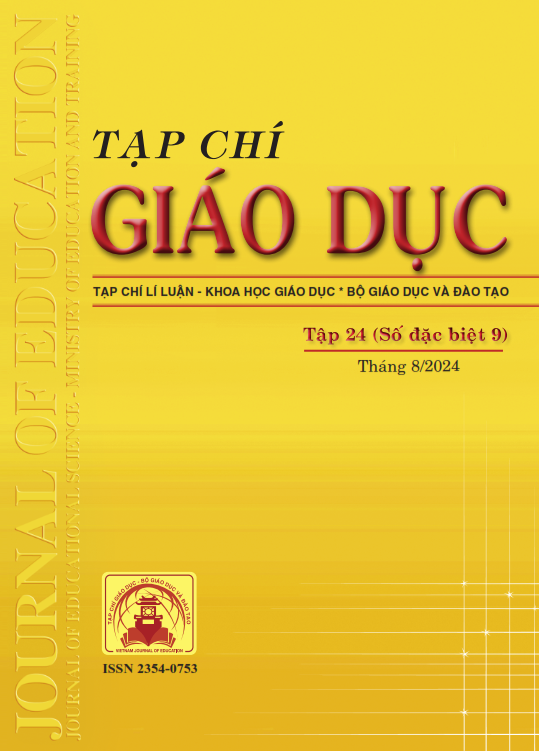Nghiên cứu xu thế đổi mới sáng tạo trong hệ sinh thái giáo dục số bằng phương pháp phân tích trắc lượng thư mục
Tóm tắt
In the current technological context, new creative changes in education have been set out in the sustainable development strategy and are a trend of interest to many researchers. A bibliometric analysis of academic documents was carried out using the Clarivate Analytics approach from the Scopus database on innovation trends in the digital education ecosystem from 2014-2023. Five emerging trends with the highest publication number, growth rate, and citations were identified based on an analysis of twenty high-frequency mentioned keywords related to the digital education ecosystem, which are about Artificial intelligence and machine learning applications, online training, blockchain technology development, and applications; cloud computing; and digital skills. The study also identified authors, organizations, and countries that highly influence these research trends. This approach maps world research centers that have firmly been implementing these hot and emerging digital education trends, which can inform Vietnam’s policy-making process and further encourage interdisciplinary and international collaborations in promoting digital education.
Tài liệu tham khảo
Clarivate Analytics (2016). Research Fronts. http://www.casisd.cn/zkcg/zxcg/201706/P020170630548078477885.pdf
Lương Đình Hải (2023). Chuyển đổi số trong giáo dục giai đoạn 2020-2022: Nghiên cứu trắc lượng khoa học. Tạp chí Khoa học Giáo dục Việt nam, 19(4), 1-7. https://doi.org/10.15625/2615-8957/12310401
Nguyễn Hữu Đức, Nghiêm Xuân Huy, Nguyễn Hữu Thành Chung (2017). Nghiên cứu xu thế đổi mới sáng tạo trong cuộc cách mạng công nghiệp lần thứ tư bằng phương pháp phân tích trắc lượng thư mục. VNU Journal of Science: Policy and Management Studies, 33(3), 1-7. https://doi.org/10.25073/2588-1116/vnupam.4076
Rojas-Sánchez, M. A., Palos-Sánchez, P. R., & Folgado-Fernández, J. A. (2023). Systematic literature review and bibliometric analysis on virtual reality and education. Education and Information Technologies, 28(1), 155-192. https://doi.org/10.1007/s10639-022-11167-5
Tan, Y. (2024). A bibliometric analysis of scholarly literature related to digital literacy in higher education during the pandemic period. Cogent Education, 11(1), 2341587. https://doi.org/10.1080/2331186X.2024.2341587
Thomson Reuters (2014). The World in 2025: 10 Predictions of Innovation. https://www.slideshare.net/ slideshow/the-world-in-2025-10-predictions-of-innovation/36473576
Wang, G., & He, J. (2022). A bibliometric analysis on research trends of digital literacy in higher education from 2012 to 2021. International Journal of Emerging Technologies in Learning, 17(16), 43-58. https://doi.org/10.3991/ijet.v17i16.31377
Tải xuống
Đã Xuất bản
Cách trích dẫn
Số
Chuyên mục
Giấy phép

Tác phẩm này được cấp phép theo Ghi nhận tác giả của Creative Commons Giấy phép quốc tế 4.0 .












